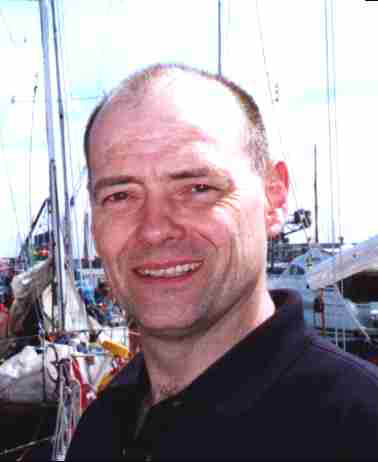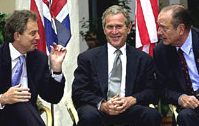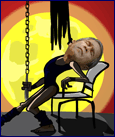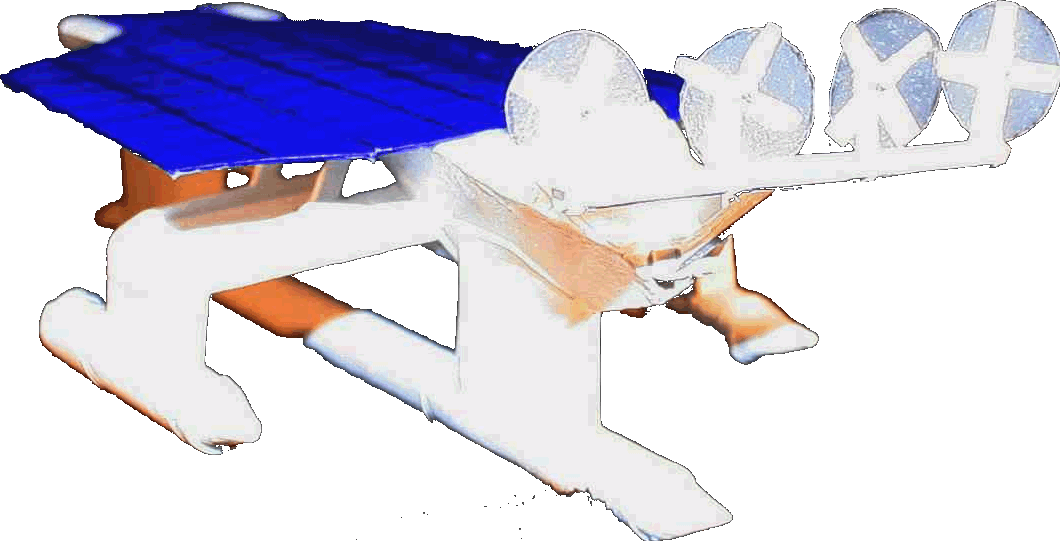|
G8 SUMMIT 2005
|
|||||||||||||||||||||||||
|
With no headquarters, budget or permanent staff, the Group of Eight is an informal but exclusive body whose members set out to tackle global challenges through discussion and action.
The G8 comprises seven of the world's leading industrialised nations, and Russia. The leaders of these countries meet face-to-face at an annual summit that has become a focus of media attention and protest action.
Leaders of G8 countries aim to:
Boost cooperation over trade and finance Strengthen the global economy Promote peace and democracy Prevent and resolve conflicts
Nelson Kruschandl - "Well done on famine relief - what about global warming?"
OVERVIEW
The G8's roots lie in the oil crisis and global economic recession of the early 1970s. In 1973, these challenges prompted the US to form the Library Group - an informal gathering of senior financial officials from Europe, Japan and the US.
At the instigation of the French, the 1975 meeting drew in heads of government. The delegates agreed to meet annually. The six nations involved became known as the G6, and later the G7 and G8 after the respective entries of Canada (1976) and Russia (1998).
Initially set up as a forum for economic and trade matters, politics crept onto the G7 agenda in the late 1970s. Issues under consideration at recent summits have included helping the developing world, global security, Middle East peace and Iraq reconstruction. G8 members can agree on policies and can set objectives, but compliance with these is entirely voluntary. The G8 has clout in other world bodies by virtue of the economic and political muscle of its members.
The workings of the G8 are a far cry from the "fireside chats" of the Library Group in the 1970s. Holed up behind fortress-like security, the delegates are accompanied by an army of officials. Elaborate preparations are made for their meetings, statements and photo-calls.
Nevertheless, G8 leaders strive to keep at least some of their encounters free from bureaucracy and ceremony. On the second day of their summit the leaders gather for an informal retreat, where they can talk without being encumbered by officials or the media.
The European Union is represented at the G8 by the president of the European Commission and by the leader of the country that holds the EU presidency. The EU does not take part in G8 political discussions.
FACTS
LEADERS
The presidency of the G8 rotates between the group's member nations on an annual basis. The country holding the presidency in a given year is also responsible for hosting the annual summit, and for handling the security arrangements. As the foremost economic and political power in the G8, the US is regarded as the dominant member of the group, although this position is not formally enshrined.
ISSUES
Critics of the G8 have accused the body of representing the interests of an elite group of industrialised nations, to the detriment of the needs of the wider world. Key countries with fast-growing economies and large populations, including China and India, are not represented. There are no African or Latin American members. The G8's positive stance on globalisation has provoked a vigorous response from opponents, and riots have sometimes overshadowed summit agendas, most notably in Italy in 2001.
The violence has encouraged a tightening of the security cordon that separates protesters and politicians, reinforcing the G8's closed-door image. In recent years the G8 has launched drives to counter disease, including HIV-Aids, and has announced development programmes and debt-relief schemes. But aid is often dependent on the respect for democracy and good governance in the recipient countries. Critics say that spending on such initiatives is inadequate.
Basic disagreements sometimes emerge within the G8: Global warming was a sticking point at the 2001 Genoa summit, where US President George W Bush underlined his rejection of the Kyoto treaty on emissions. Rifts among G8 members have also been evident over the US-led war in Iraq.
Background | The summit agenda | Venue | Participants | Local Impact
Local Security | Insurance Cover | Business Opportunities | Glossary
Publications | Africa | Climate Change | Frequently Asked Questions
What is the G8 Summit? | About G8 Tartan
G8 PRESIDENCY
2001: Italy (Genoa summit) 2002: Canada (Kananaskis summit) 2003: France (Evian summit) 2004: US (Sea Island summit) 2005: UK (Gleneagles summit) 2006: Russia
Global Warming | Waste Recycling | Climate Change
MORE ON AGENDA 21 MEMBERS OF PARLIAMENT A-Z HOUSE OF LORDS A-Z COUNCIL'S AGENDA 21
BBC Links
FEATURES & ANALYSIS
Aminata's
hopes
G8 PROTESTS
Africa
Links
Tony Blair - promises like piecrust
Tony Blair has also signaled a shift away from legally binding targets key to tackling climate change. Please e-mail your MP to urge Tony Blair not to turn his back on climate change. Visit our information page to find out more.
Dr Ashok Sinha, Director of Stop Climate Chaos, said "Tony Blair’s recent remarks on climate change are giving Kyoto’s opponents - in particular President Bush - the ammunition to kill off the Protocol. For a Prime Minister who has championed climate change throughout his EU and G8 Presidencies Tony Blair is now in real danger of undermining the most important climate change agreement ever."
President Bush loves oil - Watch "Climate Mash"
ACT NOW: Ask your MP to urge Tony Blair not to turn his back on climate change (90 seconds is all it takes).
Or read more first Thank you for your support - the Climate Change Campaign Team
CLIMATE CHANGE: RELATED STORIES
"The Climate Mash" is hilarious, but the effects of global warming aren't funny. Global warming puts our health, our economy and our environment at risk. It's time to demand that major polluters like ExxonMobil and others stop resisting solutions that could make a real difference.
Your voice is needed to overcome the polluters who are trying to bury clean energy solutions. NOW is the time to tell your elected representatives in Washington that you want their commitment to solving global warming.
More Climate Mash Stuff!
For The News Media
For the Fans
Credits
Climate change is a global challenge and requires a global solution
Greenhouse gas emissions have the same impact on the atmosphere whether they originate in Washington, London or Beijing. Consequently, action by one country to reduce emissions will do little to slow global warming unless other countries act as well. Ultimately, an effective strategy will require commitments and action by all the major emitting countries.
The international response to climate change was launched in 1992, at the Earth Summit in Rio de Janeiro, with the signing of the United Nations Framework Convention on Climate Change (UNFCCC). The Convention established a long-term objective of stabilizing greenhouse gas concentrations in the atmosphere "at a level that would prevent dangerous anthropogenic interference with the climate system". It also set a voluntary goal of reducing emissions from developed countries to 1990 levels by 2000 - a goal that most countries did not meet.
Recognizing that stronger action was needed, countries negotiated the 1997 Kyoto Protocol, which sets binding targets to reduce emissions 5.2 percent below 1990 levels by 2012. The Protocol entered into force on February 16, 2005, which made the Protocol's emissions targets binding legal commitments for those industrialized countries that ratified it (the United States and Australia have not ratified it). In addition, the market-based mechanisms established under the Protocol, including international emissions trading and the Clean Development Mechanism, became fully operational with the Protocol's entry into force.
CONTACTS:
UK
Environment Agency Greater
London Authority
In order to view the Appendices and other confidential information, investors will need to complete a Non Disclosure Agreement, which is available on request.
Solarnavigator is a battery electric trimaran with an extremely efficient active hull that runs on solar power = energy from nature. This hull form has never been attempted before, nor has the use of wind energy been used in such manner for crew comfort.
Email:
+ 44 (0) 1323 831727 +44 (0) 7842 607865
Blueplanet Netdirect Productions, Solar House, BN27 1RF, United Kingdom
Galley | Paints | Screens | Diving Project Estimates | Record Attempt | PR Events Batteries | Alloys | Timber | Composites | Navigation | Hydraulics Motors | Electronics | Solar Panels | Propeller | Transmission | Tooling | Life Support Tank Testing (Model Construction)& Results
The design of the Solar Navigator boat has been licensed for use in the John Storm series of books by Jameson Hunter - Filming, etc
|
|||||||||||||||||||||||||
|
This website is copyright © 1991- 2012 Electrick Publications. All rights reserved. The blue bird logo and names Solar Navigator and Blueplanet Ecostar are trademarks ™. The Blueplanet BE3 vehicle configuration is registered ®. All other trademarks hereby acknowledged and please note that this project should not be confused with the Australian: 'World Solar Challenge'™which is a superb road vehicle endurance race from Darwin to Adelaide. Utopia Tristar is a trademark for sustainable zero carbon housing. Max Energy Limited is an educational charity working for world peace. |
|||||||||||||||||||||||||
|
AUTOMOTIVE | BLUEPLANET BE3 | ELECTRIC CARS | ELECTRIC CYCLES | SOLAR CARS | SOLARNAVIGATOR |
|||||||||||||||||||||||||









